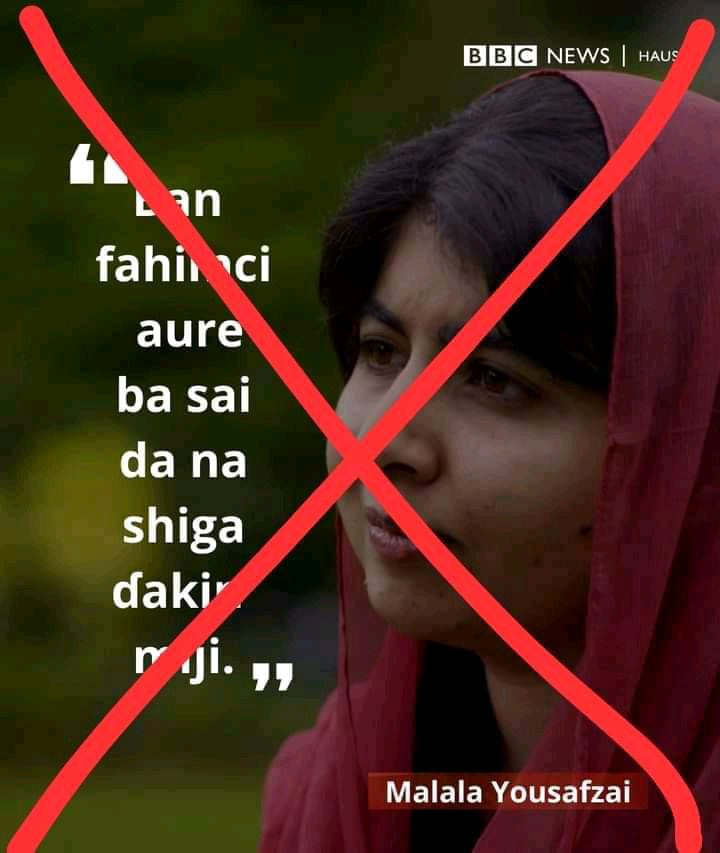Global Issues
Malala’s Marriage: BBC Hausa and the Issue of Contextomy -By Muhammed–Bello Buhari
She never even implied that. In fact, what can be implied from her clarifications is that due to the concerns she had about marriage which is true for many girls around the world who have seen reports about child marriage and reports about forced marriage, she feared losing her independence – and her solution was to avoid getting married at all.

Earlier this month, Malala Yousafzai, a Nobel Peace Prize recipient and a human rights activist — who has openly talked about her feminist values — got married to Asser Malik in a private Nikkah ceremony in Birmingham, UK. But since the photos from the day were shared on social media, in which the bride looked stunning in traditional wear and appeared to be very much in love, critics jumped in to remind the 24-year-old about an old interview of hers, in which she had shared that she was not too keen on getting married. The girls’ education advocate had previously told British Vogue that she felt marriage was not for her due to the concerns she had about it which has to do with imbalances of power.
I stopped commenting on Malala’s statements the moment I realized that many who do, subject their understanding only to a headline or quoted text. However, this article is not interested in addressing the misconceptions about those concerns, her statements, feelings, position, or beliefs. But about how her statements have continuously been misinterpreted, misrepresented, and quoted of context, and the role, BBC Hausa plays in this contextomy.
Contextomy refers to the selective excerpting of words from their original linguistic context in a way that distorts the source’s intended meaning, a practice commonly referred to as “quoting out of context” [Source: Wikipedia]. In essence, contextomy prompts audiences to form a false impression of the source and contaminates subsequent interpretation when the quote is restored to its original context.
This is the case for Malala. She has [repeatedly] been the object of contextomy. It first started when the girls’ education advocate had an interview with British Vogue where she shares her feelings about marriage. Her statement reads, “I still don’t understand why people have to get married. If you want to have a person in your life, why do you have sign marriage papers, why can’t it just be a partnership?” [July, 2021]
But when she later got married, many news media outlets were selective on what part of her interview to quote and what nearby phrases or sentences to exclude. Most of the headlines reads either “I don’t understand why people have to get marriage” or “I don’t understand marriage”, and excluded the nearby sentence — “…If you want to have a person in your life, why do you have sign marriage papers, why can’t it just be a partnership?” This was intentionally done in order to misrepresent her position (typically to make it seem more extreme) that she is against marriage per se. Because the inclusion of “…why can’t it just be a partnership?” in the headlines or quotes will serve to clarify the intentions behind the selected words. Notwithstanding, the headliners and the quoters purpose to distort Malala’s intentions was achieved, she was believed to be initially against marriage.
Nevertheless, on November 15, [clarifying her initial statements] appearing on BBC One’s The Andrew Marr Show, Malala said, “I was not against marriage, I had concerns about marriage and that is true for many girls around the world who have seen reports about child marriage and reports about forced marriage.” She added that she saw there was an imbalance of power in marriages where “women make more compromises than men”. “A lot of these customs are influenced by patriarchy and misogyny. So you have to question the systems that we are living in and we have to question the status quo, but I am lucky that I found a person who understands my values,” she was quoted as saying.
She also wrote an article for Vogue last week, wherein she explained her previous doubts, and what she thinks now that she is married. “I wasn’t against marriage, but I was cautious about its practice,” the article, dated November 11, read. “I questioned the patriarchal roots of the institution, the compromises women are expected to make after the wedding, and how laws regarding relationships are influenced by cultural norms and misogyny in many corners of the world. I feared losing my humanity, my independence, my womanhood – my solution was to avoid getting married at all. My conversations with my friends, mentors and my now partner Asser helped me consider how I could have a relationship – a marriage – and remain true to my values of equality, fairness and integrity,” Malala wrote.
In all the aforementioned where Malala clarified her initial statements, she never said that she was initially against marriage until now that she is married or that she changed her position (celibacy) due to what she is now feeling at her matrimonial home. She never even implied that. In fact, what can be implied from her clarifications is that due to the concerns she had about marriage which is true for many girls around the world who have seen reports about child marriage and reports about forced marriage, she feared losing her independence – and her solution was to avoid getting married at all. But she stopped having that fear when she was helped by her friends, mentors and her now partner, Asser, to consider how she could have a relationship – a marriage – and remain true to her values of equality, fairness and integrity.
But despite all these clarifications by Malala and by many others, and in what can be considered to be contextomy, BBC Hausa inaccurately quoted her to have said [in her clarifications], “Ban fahimci aure ba sai da na shiga ɗakin miji” which can be translated to read, “I did not understand marriage until I find myself in my matrimonial home” which is misleading the public to think that the she mistook the idea of marriage or the concerns she has about marriage is no more or she regrets her alleged position (celibacy) about marriage.
For the avoidance of doubt, Malala never said that statement as quoted and used as a headline by BBC Hausa. What she said was “I was not against marriage, I [only] had concerns about marriage…” [Appearing on BBC One’s The Andrew Marr Show]. And “I wasn’t against marriage, but I was cautious about its practice,” [She wrote in an article for Vogue last week, wherein she explained her previous doubts]. To further pinpoint on this intentional and deliberate misrepresentation by BBC Hausa, it’s main outlet, BBC News [English] reported the same Malala’s statement reported by it’s subsidiary, BBC Hausa, as follows: ‘‘I had concerns about marriage” and used same as the headline. But I wonder — in all possible interpretations or translations to Hausa — how what she said here can be translated to this [in Hausa], “Ban fahimci aure ba sai da na shiga ɗakin miji”.
Consequently, the problem here is not the removal of the quote from its original context per se (as all quotes are), but to the BBC Hausa’s decision to exclude [entirely] from the excerpt certain nearby phrases or sentences (which become “context” by virtue of the exclusion) that serve to clarify the intentions behind the selected words they used as a headline. In this case, Malala never even said that as attributed to her by BBC Hausa. And studies have demonstrated that the effects of this misrepresentation can linger even after the audience is exposed to the original, in context, quote.
BBC Hausa must therefore denounce the art of quoting out of context as it’s very unethical and must also apologize to Malala for attributing a statement that was never uttered by her. Because a contextomized quotation not only prompts audiences to form a false impression of the source’s intentions, but can contaminate subsequent interpretation of the quote when it is restored to its original context.
And to the readers and the general public who are always fond of subjecting their opinions to a headline or a particular selected words from a source — Your biases give fake news and contextomy potency. Stay sceptical and always be objective. It may be hot gist but what do the facts say? Find out! Read the interview or article in it’s entirety, not just the quote or headline. A lot of things can be fake on social media — check, double-check, and check again.
#WeekForTruth
— Muhammed-Bello Buhari (MB Buhari) is a political and public affairs analyst. He writes from Kaduna and can be reached via embbuhari@gmail.com



















